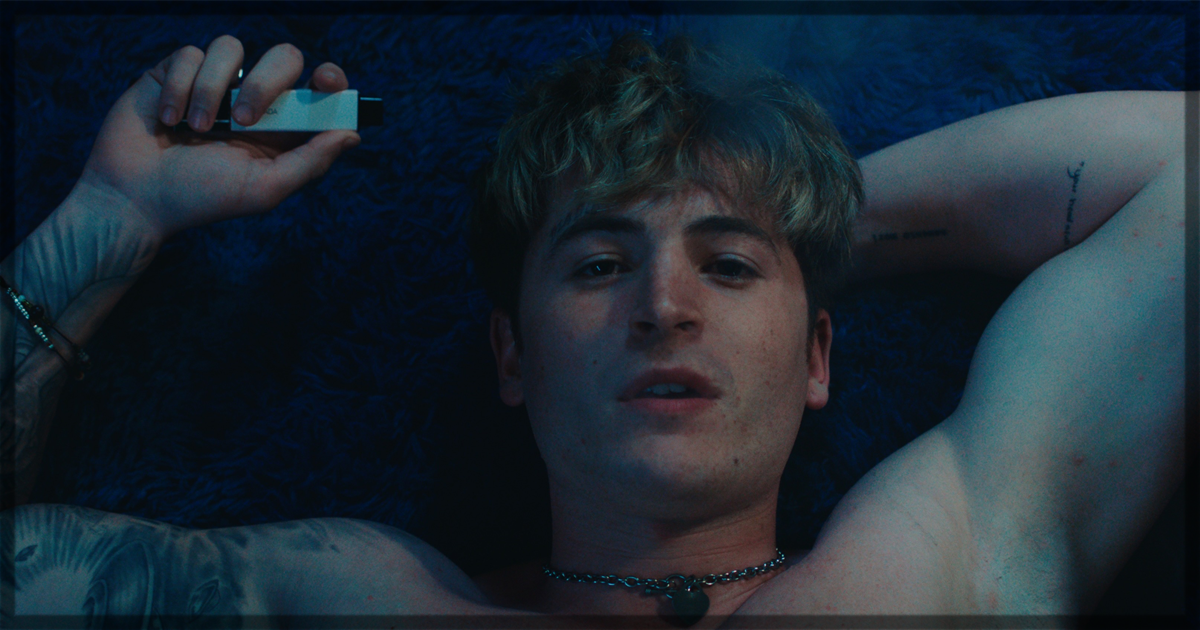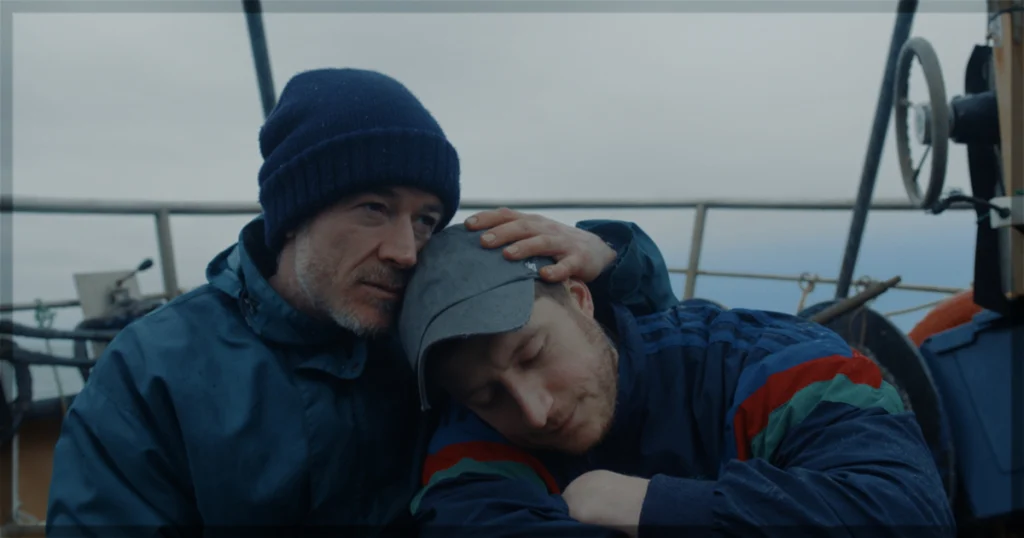From the title of Blue Film, writer and director Elliott Tuttle’s feature debut suggests titillation. This unbelievably challenging work, however, is something far more slippery, enigmatic, and subversive than simple thrills within the milieu of modern sex work. Indeed, the on-screen sex scenes are brief and shot with a curious detachment. The conversations that play out within this two-hander are what ratchet the tension – and pulses – sky-high.
Aaron Eagle (Kieron Moore) is a Los Angeles “camboy” – a male sex worker who livestreams to an online audience. His speciality is taunting and degrading his gay male followers for cash, and he excels in his field as we see in the film’s bold opening scene. Moore (English, but with a solid American accent) peacocks without an ounce of self-consciousness, entirely convincing as a man who makes very good money capitalising on pure confidence and a muscular physique; for an actor with no major film credits beyond Blue Film, his performance is a revelation and portends a great new talent on the rise.
What kicks off the action of Blue Film is an offer from one of these online fans: $50,000 to spend the night with him in person. Such cash is hard to refuse, and Aaron arrives at the Airbnb to find a man in a balaclava who knows a lot about him already– so much, in fact, that he cannot have learned all of this from Aaron’s cam-work alone. As the masked man steadily chisels away at the identity Aaron has created, the conversations go from convivial to unbearably tense. Aaron is younger, stronger, and unafraid to show aggression; the mystery man, however, is calm and calculated in a way that cannot be shaken.
When the man finally shares his identity, the film skyrockets into a whole new level of disturbing: he is Hank Grant (Reed Birney), a former primary school teacher of Aaron’s in Maine, decades ago. He recently got out of jail for attempting to sexually assault one of Aaron’s classmates, and he has spent nearly his life savings on this night between the Airbnb rental and the hefty fee with which he entices Aaron here. Hank wants to know if he still has the same feelings he had for Aaron as a child – in his words if he still “loves” him.
Many other, possibly more salacious, films might save that as the final twist, but this revelation comes relatively early on in Tuttle’s script. The real conflict is the conversational power dynamic that continually shifts with each character knowing fatally compromising information about the other, and deciding how they are going to take this transaction, relationship, or unfulfilled fantasy – on both sides – forward.
Clocking in at a brisk 85 minutes, Blue Film is a hyper-intense battle of wills that dances at the boundary of good taste. The lines between humanising and sympathising can be a gossamer thread, and pedophilia and child abuse are never topics to take lightly or make excuses for. Tuttle does not do so in either case, but he is not interested in moralising. Instead, he seeks to get under the skin of both characters and examine the darkest corners of desire (versus love, versus lust, versus affection) and what humans have done, or will do, to satisfy them. Unnervingly, this nexus cannot always be explained away by such easy terms as “evil”, “depraved”, or “unnatural”. Tuttle’s script avoids forced or false equivalencies, but over the course of this harrowing night, it becomes clear that the desire for power may be the most natural and human drive there is.
Birney, known more for his New York stage appearances, has the Herculean task of finding some humanity in a man capable of – even craving – monstrous acts. Ryan Jackson-Healy’s cinematography and Zach Clark’s editing are slick, assured, and beautiful in composition. Fitting the film’s title, the nighttime scenes are strikingly lit and tinged in blue, establishing the nocturnal setting clearly while allowing every small detail in the Airbnb to remain visible. More importantly, the effect lends a sense of unreality and suspended time to the proceedings. These shadows offer no place to hide.
There is a well-established canon of “dark night of the soul” films, where one or more characters go through a series of tests and tribulations that shake the foundations of their being to their core. Blue Film takes this genre to the extreme, unveiling Aaron’s and Hank’s drives and understandings of themselves through meticulously crafted conversation that feel remarkably grounded in reality and psychology despite the dangerous, heightened premise. Viewers’ mileage may vary with their tolerance for the subject matter and its frank discussion – notably as one character is canonically a sex offender – but the clarity and boldness of commitment in doing so makes Blue Film unforgettable.
The calculated script, daring set-up, and fearless performances of Blue Film make it one of the standouts among the 2025 Edinburgh International Film Festival’s world premieres. The questions it asks of its characters and audience are hard to stomach and may not be something everyone feels comfortable tackling, or agrees with Tuttle’s method of doing so. That said, Tuttle’s approach – uncompromising, direct, and pulling no punches – is the best possible one for such taboo material. By treating his two (to put it mildly) complicated characters and their dilemmas with full honesty and respect for personhood (not to be confused with condoning actions), Blue Film becomes a complex nuanced picture destined to spark debate.
Blue Film recently premiered at the Edinburgh International Film Festival.
Learn more about the film at the Edinburgh site for the title.


